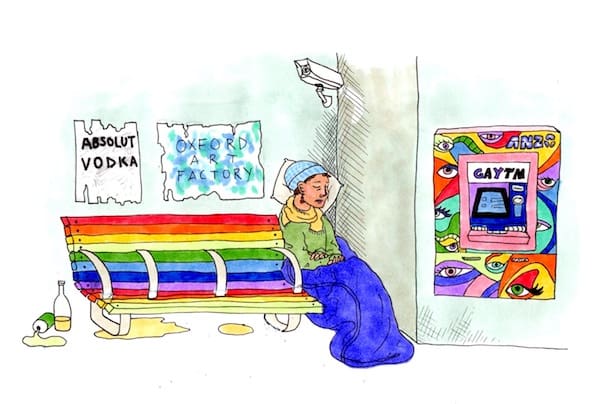Mardi Gras is heavy. The corporatisation of the parade, which first hit the streets as a protest against the discrimination and persecution of LGBTQ+ people in 1978, has in recent years weighed down on the shoulders of a new generation of activists. Community groups have fought against issues of corporatisation, police brutality and the sponsorship of companies who profit from human rights violations, through running candidates for the Mardi Gras board, passing motions at the organisation’s Annual General Meeting (AGM) and staging protest actions at Fair Day.
While it is important that these issues are met with dissent, at what point should this dissent be aimed at larger systems of inequality rather than the microcosm of Mardi Gras? How much space is it taking up in political circles?
For the past two years, the focus of new group Pride in Protest has turned to reforming Mardi Gras to the detriment of other important issues, such as the current Religious Exemptions Bill, which would allow discrimination on the basis of religious belief towards LGBTQ+ people in certain areas of public life. Running a board candidate is no easy feat, and it becomes increasingly difficult and time consuming when the candidate is backed by community groups compared to the individualistic, better funded and conservative platforms that make up a majority of successful board candidates. Pride in Protest currently holds one position out of eight on the Mardi Gras board after narrowly failing to elect a candidate the previous year.
In order for groups like Pride in Protest to elect successful board candidates, they must encourage people with similar politics and beliefs to join Mardi Gras, a membership that will set you back $50 annually. With only one successful board candidate, it is unlikely that any meaningful change within Mardi Gras can happen and it is impossible that any change of the larger systems that Mardi Gras is situated within would eventuate. Indeed, the demands levelled against Mardi Gras often seem to be aimed within the confines of Mardi Gras policy.
This year, one motion called for a review of corporate sponsors on the basis of human rights violations, including Qantas, who play a role in the deportation of refugees. Information obtained by BuzzFeed under freedom of information laws found that Australian immigration officers routinely asked queer refugees if they could pretend to be straight in order to avoid persecution in their home countries. However, while this motion highlights the very current and real issue of the deportation of queer people back to persecution, it does nothing to change the systems that allow it. With or without involvement in Mardi Gras, Qantas will play a role in the deportations unless they are met with direct action.
Perhaps the most important action Pride in Protest has performed was handing out fliers at this year’s Fair Day outside the Qantas stall highlighting the atrocities committed by the corporation. This was because it happened outside the confines of Mardi Gras policy and was aimed directly at the systems of inequality we should be seeking to change.
By contrast, LGBTQ+ London solidarity group Lesbians and Gays Support the Migrants (LGSM) have less involvement in pride events, focusing on community action, raising funds for refugees and protesting deportations with direct action. Their campaign Dear BA has received 100 letters in support of migrants remaining in the UK and dissent against British Airways who, like Qantas, play a role in the countries racist border control. LGSM seeks to change larger systems while simultaneously directly funding homeless youth and refugees who have been persecuted by the government of their home country, as well as the British government. They resist involvement in corporatised Pride in order to respond to more alarming calls to protest.
Another motion at the recent Mardi Gras AGM sought to condemn Gilead, a Mardi Gras sponsor responsible for the price gouging of the antiretroviral medication, PreP, in the US. The motion was one of two motions successfully passed by Pride in Protest, with the other demanding for the creation of an ethics charter for corporate sponsorship in consultation with community and members.
Despite these two triumphs, Mardi Gras highlighted that the final decision rests with the Board which currently has a more complacent stance on the issue of corporatisation. Gilead remains a corporate sponsor of Mardi Gras which leads to an important question: if they are not listening, why not go beyond Mardi Gras to hold companies like Gilead and Qantas accountable for their actions?
Queer liberation is heavy work. This year will see the rights of LGBTQ+ people put into question with the Religious Exemptions Bill coming to the forefront of discussion in Federal Parliament. With Newstart payments and other welfare programs remaining stagnant or inaccessible, we will only see the disproportionate homelessness of queer youth rise. With rising racism in Australia, the country’s borders will only harden.
Mardi Gras may have begun as a protest, but it is apparent that this is no longer the case; it has become part of the issue. However, in order to overcome it, it is imperative that we look at the broader picture. Now more than ever, it is important that we know which heavy load we must carry.





